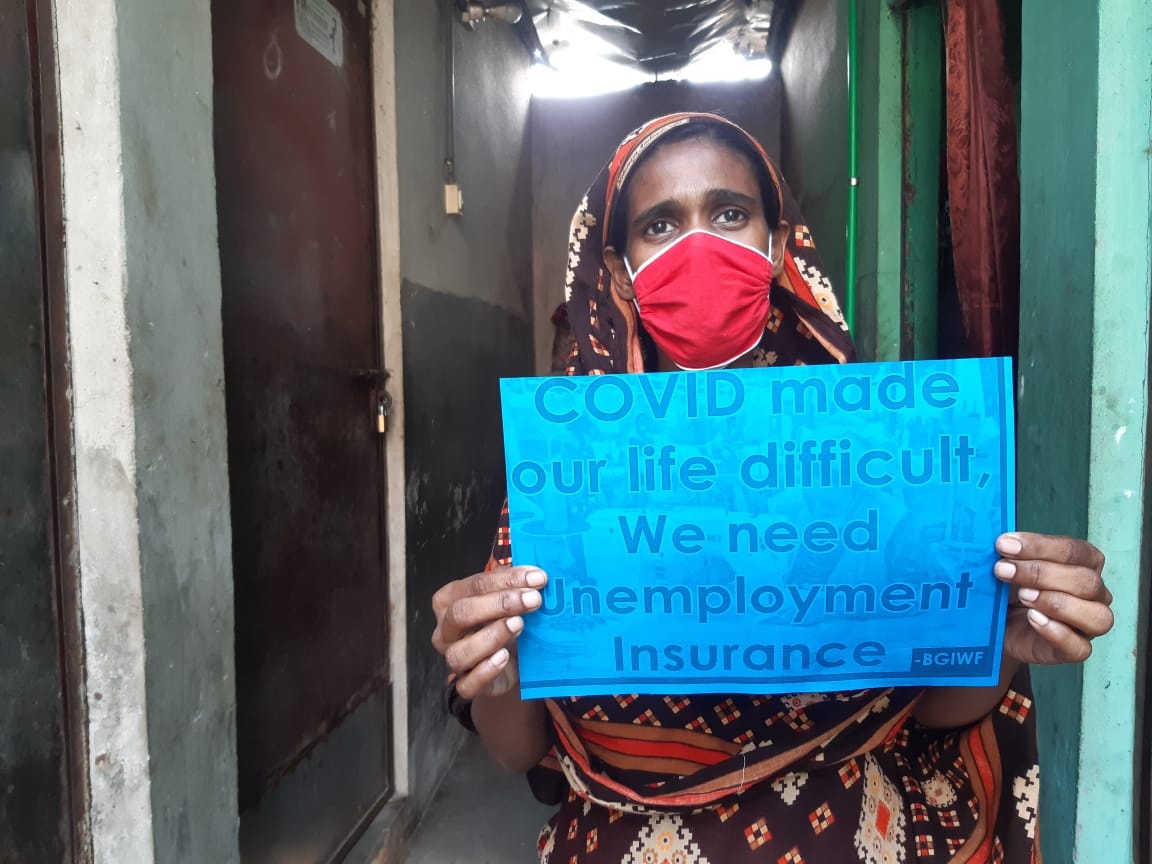7 October, 2021Today is World Day for Decent Work and we highlight the impact of Covid on garment workers and the global campaign to achieve social protection for this workforce.
When Pavi* lost her job two years ago, everything changed. Beforehand, she had been working as an operator in a garment factory in Bangladesh for over a decade. Now she has lost her income and is struggling to provide for her three children.
“I have three kids. My husband is paralysed – very sick. I’m the only source of livelihood for the family. My kids are studying in school. I have to pay the doctor’s expenses. There is so much expenses. I just can’t bear it. The children are going to school. I need a whole lot of money, but I’m not getting anything.”
The global south’s garment production countries provide big brands with low taxes and loose regulation, but few brands are meeting their obligations to factory workers.
Pavi is not an isolated case. Few garment workers have a safety net. Illness, pregnancy or redundancy can catapult families into near destitution.
The Covid pandemic has exposed and amplified the vulnerability of this labour force.
Shayan* was told to leave his job after his wife fell ill and he failed to come to work. He had worked there for almost five years. His wife was a cancer patient and was hospitalised after she contracted Covid.
"When I went back to the factory they said don’t come to work tomorrow. They used very abusive language.”
Shayan’s wife did not recover. He is now raising his 9-year-old son alone, supporting his extended family and working as a rickshaw puller to make ends meet. The factory didn’t pay him the benefits he was entitled to. With help from his union and IndustriALL, he managed to secure some of the money he was owed, but not everything.
“I’m trying to educate my son, trying to do my best for the family. If the factory gives my dues, then I think I will be able to put my son in a better position.”
Aside from those directly impacted by the virus itself, Covid has stripped thousands of their income due to factories closing or losing orders.
Manabi* wept as she told us that the factory where she worked as a finisher for the last five years closed six months ago. Unable to pay her rent or buy food, she’s been forced into crippling debt and now faces eviction.
“I’m in debt. But I’m not able to pay it back. Now nobody’s ready to give us money. If my son is asking for something to eat, I’m not able to give him anything.”
IndustriALL textile and garment director Christina Hajagos-Clausen says that the global apparel industry is failing these workers with many brands still clinging to voluntary initiatives and individual factory audits.
"If we want to achieve decent work in the garment sector, supply chain commitments must be legally enforceable. Voluntary gestures don’t cut it. We need binding agreements between brands, manufacturers, and unions that provide workers with the safety net they deserve. The newly negotiated International Accord on Health and Safety in the Textile and Garment Industry provides the model for how modern-day supply chain industrial relations should look like."
Strengthening union power within the sector is key. Organising workers locally will create greater leverage to put these safety nets in place. By joining forces internationally, and participating in IndustriALL’s global campaign, unions can help transform the whole sector.
*Names have been changed to protect workers’ identity, but workers’ quoted here are all from Bangladesh.
What is social protection?
Social protection is a set of policies and programmes designed to reduce and prevent poverty and vulnerability throughout the life cycle. Social protection includes benefits for children and families, maternity, unemployment, employment injury, sickness, old age, disability, survivors, as well as health protection.
Social protection can be provided by the state, through contributory schemes or tax-financed benefits, or by other stakeholders such as employers.
About the apparel industry
Almost 80 per cent of jobs in the apparel sector are held by women, while women make up only a third of the manufacturing workforce globally. Jobs where the majority of the workers are women tend to have low wages, long working hours, exposure to occupational health and safety risks as well as violence and harassment.
Government import data for the United States and European markets shows a US$16 billion gap in clothing imports for 2020, largely due to cancelled orders.

